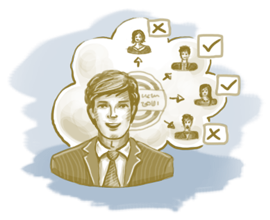 It is absolutely true that sales strategies (and, therefore, salespeople) require the aid of technology.
It is absolutely true that sales strategies (and, therefore, salespeople) require the aid of technology.
This is especially true today with the volume and velocity of data required to acquire, qualify, work and close leads in a highly competitive environment.
The workability and usability of that technology is key. A CRM solution that empowers a sales rep to organize, control, analyze and forecast sales is a primary factor in the success of that sales rep. A salesperson’s success declines in direct proportion to the amount of work—and additional “solutions”—that rep has to engage in to make up for the lack of an adequate CRM application.
But even the best of intuitive, usable technology can only take a sales rep so far. Given a state-of-the art technical solution, what other CRM tools contribute directly to a sales rep’s survival and further success?
Stalled Skill Levels
There is a breed of salesperson who, when first involved in sales, is doing so with a considerable degree of native skill. Such a person usually has an interest in sales and in selling early in life—sometimes even in childhood—and just starts doing so. They then encounter a degree of success in bringing others to recognize that they need a particular product, or they tap into an existing want and turn that into a “need.”
Such native skill is obviously a blessing. But that blessing becomes a curse when the salesperson is convinced through their success that they already know everything they need to know about selling, and couldn’t use improvement or at least strengthening of their existing skills.
Far more common than the “innate sales genius” is the person who starts off not being able to sell well, and learns and gets better as he or she goes along. They apprentice under experts, acquire closing techniques from seminars, books, and by observation. They reach an acceptable level of skill and take a job—but often at that point they follow the same path as the salesperson with plenty of native ability and stop learning and growing, if only for lack of time.
This cessation of skill enhancement has a profound impact on the average closing ratio for a company or a company’s product line. That average closing ratio is a composite of closing ratios for each of the sales reps. If those reps’ closing ratios never substantially improve, what does that mean for the company, its sales strategies and sales goals?
The Ever-Improving Sales Strategies
On the other hand, what might occur if every salesperson was consistently getting better at his or her job?
For example, a sales rep is forecast to close $1 million for a particular quarter, based on their average closing ratio. They normally close 25 percent of everything they’re working, and there is $4 million of “raw material” in that rep’s pipeline, so it looks like that rep is on target to meet that expectation.
Let’s say that rep was obtaining regular sales skill enhancement as an everyday part of their job. Their level of ability to close is steadily improving, and the rep’s average closing ratio, partway into the quarter, can be seen to have risen to 25.5 percent. That $1 million forecast could then be increased by $20,000.
If every sales rep on a team is regularly receiving this kind of enhancement, you can easily see what it might mean for the company meeting and exceeding forecasts and sales quotas. And, of course, for the company’s overall viability, profitability and survival.
Even the best of technology will bring sales reps and therefore sales strategies only so far. Look to the regular skill enhancement of your salespeople—and start exceeding your expectations.
Watch for our other articles on enhancement of sales strategies and sales reps.




















